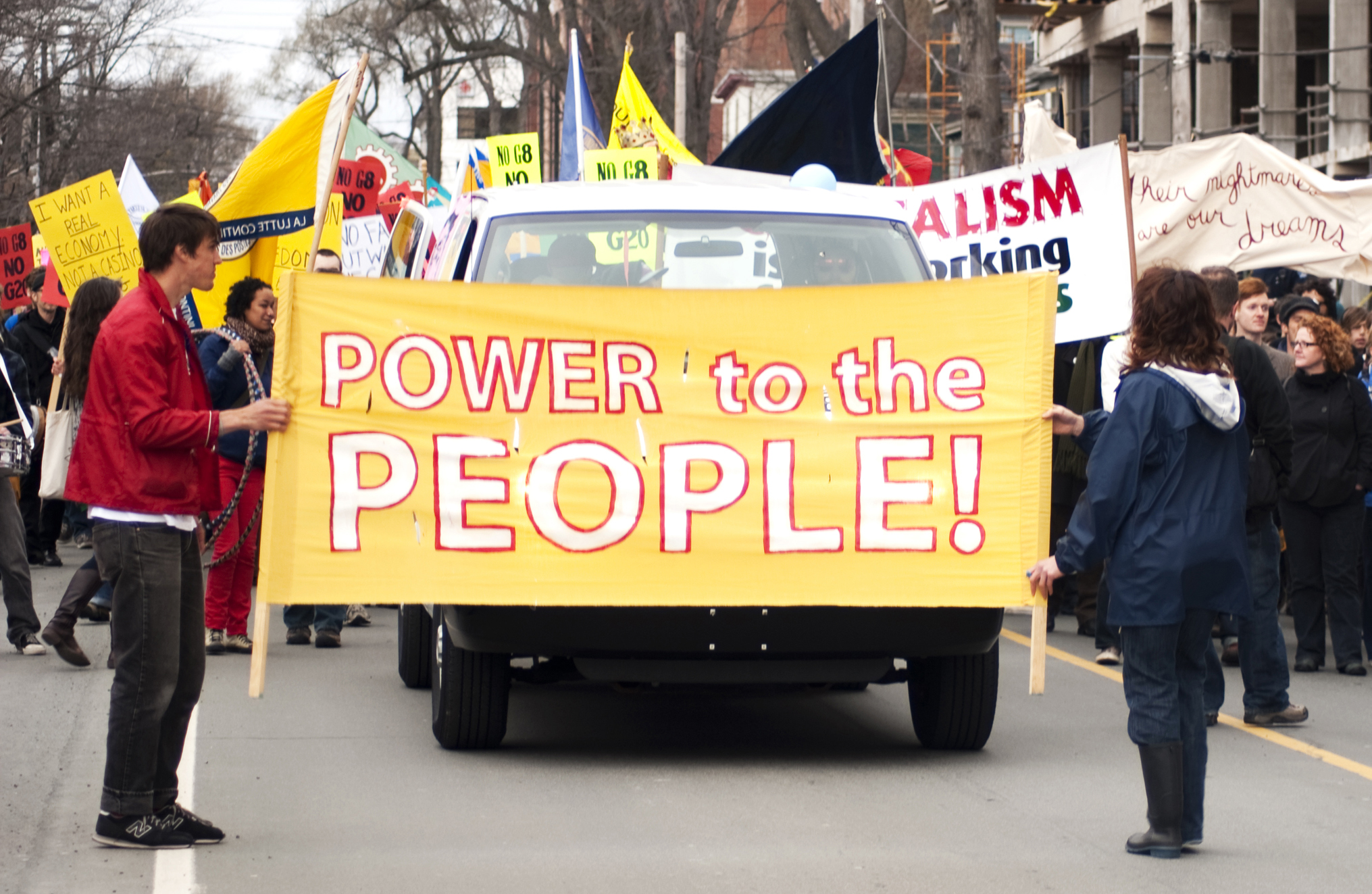As the G8 development ministers prepared to meet in Halifax from April 26 to 28, the city’s grassroots mobilized, with a colourful, festive community-based opposition rallying in public spaces.
Were it not for these protest speeches in the public parks, the large Sunday march in Halifax’s downtown streets, and an early Monday picket, the G8 meeting in Nova Scotia would have gone largely undetected by the public.
The “G8 Welcoming Committee,” as the coalition named itself, includes organized labour unions, First Nations groups, student organizations, women’s groups, and environmental networks.
In a letter to Halifax newspaper The Chronicle Herald, Development Minister Bev Oda wrote enthusiastically about Canada’s role amongst the world’s most powerful countries: “Canada has always stood for providing the opportunity for a better life to people from other parts of the world.”
While she and the other G8 development ministers addressed the theme of maternal health at the urging of Prime Minster Stephen Harper, a local women’s group criticized the handling of the issue.
Kaley Kennedy, a representative of the Feminist League for Agitation and Propaganda, criticized the G8 and Harper for a narrowly focused approach to maternal health. “Where are the G8 leaders when women, many of them mothers, are raped, tortured, and/or killed at work, whether they’re working in Maquiladoras in Mexico or doing sex work in Vancouver’s Downtown Eastside?” asked Kennedy.
She also reprimanded Harper and the other G8 leaders for not considering family planning and abortion as part of the maternal health framework. She cited Canada cutting funding to the International Planned Parenthood Federation as an example of this lack of support.
The Halifax-Dartmouth and District Labour Council called attention to the overall role the G8 plays in determining the fate of the global economy. Kyle Buott, president of the Labour Council, addressed the protesters with a statement on behalf of the 26,000 affiliated member workers.
“The G8 countries are responsible, through the economic policies they pushed on the rest of the world, for the recession that is wrecking the lives of billions of people on this planet,” he said.
“The economic and social policies of the G8 are directly responsible for reducing the standard of living for millions of workers in Canada, and for causing the growing the gap between the rich and the rest of us.”
The Labour Council’s current campaign, “Capitalism isn’t Working for Workers” was formed in response to the global economic crisis.
Sunday’s march of several hundred participants ended in Halifax’s Cornwallis Park, which was named after the infamous first Governor of Halifax, Edward Cornwallis, who issued a bounty in 1749 for each for each Mi’kmaq scalp collected. As the rally participants arrived at the destination, two protesters covered the statue with a sheet fastened with electrical tape. At the base of the monument, they posted a makeshift sign reading “Halifax Peace and Freedom Park”, with “Cornwallis Genocide Park” in crossed-out red letters.
The first three speeches under the sheathed monument included First Nations representatives, who each spoke about how colonial notions of development have harmed people and the earth.
Jada Voyageur from the Athabasca Chipewyan First Nation in northern Alberta talked about how the community at Fort Chipewyan was impacted by the Tar Sands operation. The community, she said, suffers from rare cancers. The nearby tailings ponds leak into the Athabasca River.
“But it’s difficult when the only jobs available for the people are in the tar sands project,” she said. “It limits people in how they can speak out.”
A smaller information picket was held Monday, April 21 at 7am. Fifty participants marched along Marginal Road towards Pier 21 (where the G8 development ministers meetings were due to take place) before being stopped by police lines. Despite the smaller size of the early morning group, there was a heavy police presence.
Toni McAfee, Atlantic region education and organization officer with the Canadian Union of Postal Workers, was arrested as the police herded protesters onto a small stretch of sidewalk shortly. MacAfee was later released.
The Halifax chapter of Food Not Bombs was on site at both the Sunday afternoon and early Monday morning events to serve sandwiches, soup, and snacks to the demonstrators.
Despite the arrest, protesters remained in good spirits and felt the demonstrations, rallies and marches were successful.
Suzanne MacNeil is a student and activist based in Glace Bay, Nova Scotia.



